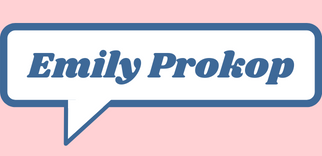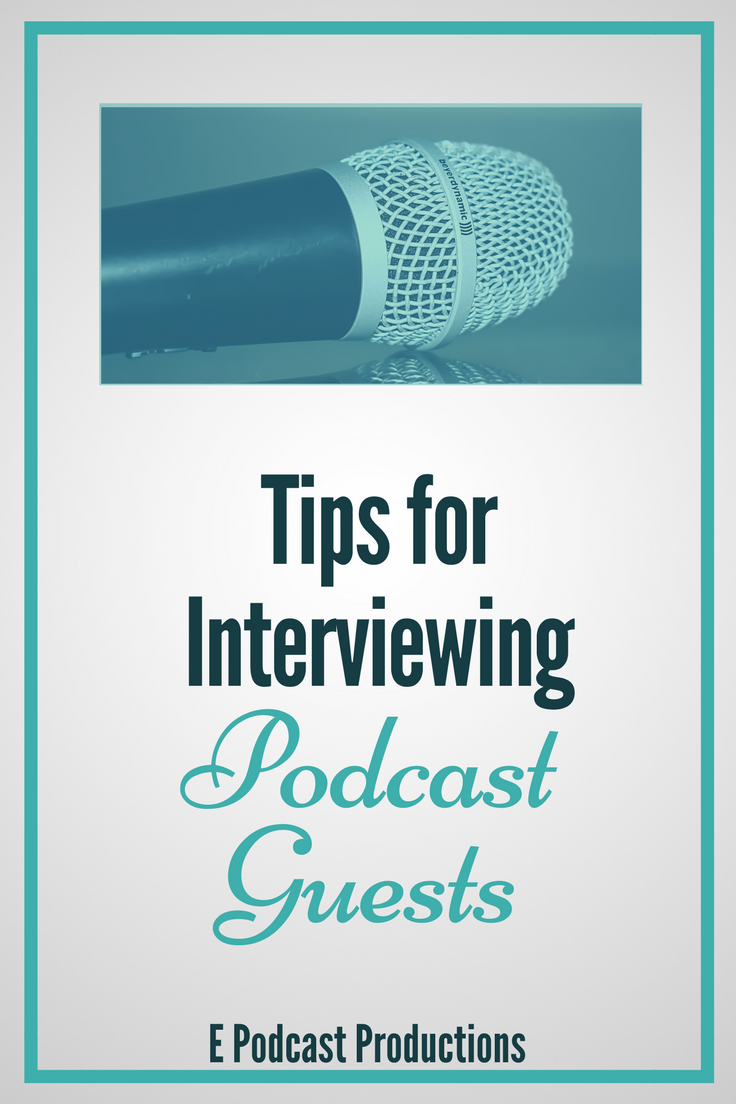While you might be comfortable (or getting comfortable) behind the microphone, your guests might not be. Although they may have amazing insights to share and your audience will love them, it's still nerve-wracking to be put on the spot.
I can't do everything to take away their nerves (aside from giving you my recipe for Sangria, maybe), but I can offer some tips to help them feel more at ease about sounding good.
While it might be easier to have your guest join you in your studio, it's not always possible. The tips in this post are for podcast interviews done remotely.
You can also click the button below to sign up to receive a FREE Podcast Guest Tips & Common Questions PDF you can send to your guests ahead of time or use for yourself when you're inerviewed!
On your end
It's important to take as much off your guest's plate as possible.
Being able to say "don't worry about it" will go a long way to take some of the pressure off your guest. Here are a few things you can do on your end.
Recording
If your guest isn't a podcaster, don't expect them to download recording software and learn how to use it to record a double-ender. If they are, it's still a nice gesture (and a good backup) to record on your end, even if they are also recording on their end. Personally, I use Open Broadcaster Software (OBS) to record anytime I'm doing an interview, just as a backup.
If you have a capable mixer or interface, you may want to do a mix-minus set-up, and Ray Ortega from The Podcasters' Studio and Podcasters' Roundtable has some amazing posts and videos showing you different ways to set that up.
If you're using Skype, record both sides on your end with a Skype recorder. I suggest to my clients Amolto Call Recorder for Skype (Free, Windows and Mac) or Ecamm Call Recorder for Skype ($40, Mac only).
If your guest isn't on Skype, using a software like Ringr allows you to send them a link for them to click and it will record both ends with separate audio for super clean finished tracks. This was specifically designed with podcasters in mind.
There is an option in Zoom to record separate tracks, even on the free plan.
Another similar option is using Zoom, which is a meeting software, and there is an option to record separate tracks.
There are a number of other ways to record, like Google Hang-outs on air and other software. It seems new ways of recording guests using hardware and software are coming out every day. If I hear about a new software, I will be sure to update this list and let my newsletter subscribers know.
Setting Up the Interview
Aside from recording, it's important your guest is relaxed and feels comfortable in the interview — this will make editing later a lot easier, too. Even when I was studying journalism in college, I had to learn how to make someone comfortable and at ease when speaking to me.
Let them know ahead of time why you want to have them on your show and what you hope to get out of the interview. Setting up a good proposal should include information about your show, why they'd be a good fit for your show and your audience (do your research!), how your audience will benefit from the specific knowledge you'll be asking about, and if there is anything specific you want to focus on.
My journalism professors will probably roll their eyes at this, but in the case of podcast interviews, where you're providing education and insights to your audience, if you want to send some questions in advance to your guest, it will help them feel more comfortable. For the most part, podcasters aren't "Gotcha Journalists," and we want to give great value to not only our audience but also our guests for taking the time to come on our shows. You might not get to all of them, but it will also show you've done your research on them ahead of time.
“Podcasters aren’t “Gotcha Journalists,” and we want to give great value to not only our audience but also our guests.”
When writing your proposal, send them a sample episode of your show with a guest similar to them to give them an idea of what being on your show will be like. Send them a clickable URL that has an easy way to listen either in a web browser or on a mobile web browser, not your Apple Podcasts link.
Make it easy for them to set up a time. Don't just say "whatever works for you" and play email-tag back and forth. Using a software like Acuity Scheduling (which I use for my Consultation and Strategy Session clients) or Calendly is a great way for them to see your availability and pick the most convenient time for them.
Send them a reminder email a day or two before, and it would be nice if you make it sound friendly and casual (if you have the time, a personalized note would be better than an automated, bland email).
The interview
As soon as you connect for the interview, give your guest the sense that it's more like a conversation. It's not a job interview or an evaluation (unless that's the purpose of the interview), but a casual back-and-forth exchange of ideas.
Warm them up before pressing record. Ask how their day is going, have some small talk, go over some of the questions that will be asked and how the show is formatted, go over anything technical they should be aware of, and above all, let them know that podcasts can be edited and if they make a mistake and want to start a thought over, they can and their mistakes will be taken out. Let them know if they say something in the interview and decide later on they shouldn't have said it, they can contact you and you'll be glad to take it out.
Start with the easy questions. Getting them to talk about themselves will help open them up. Even adding some small talk can help break the ice, and you can always edit that out later.
Be aware during your interview how your guest is answering questions. If they seem flustered, let them know it's OK to stop and take a break for a moment while they collect their thoughts. They might not feel comfortable asking for that break, so be proactive about the situation and initiate breaks as needed.
Be sure to listen to their answers and don't race to get to the next question. If they touch upon a point that's interesting and you think your audience would benefit from, don't be afraid to veer away from your original questions to explore that topic further.
If they make a mistake, encourage them to start their thought or phrase over again to make editing easier.
“Be sure to listen to their answers and don’t race to get to the next question.”
As much as you want your guest to feel comfortable, if they bring up a term or phrase your audience might not be familiar with it, explain it to the audience or ask your guest to explain it.
Let your guest tell the story. If you look at the final audio tracks, your guests should have more on their side than you should. This isn't the time to relate everything they say back to your life or give your take on every point they make. If you want to comment on what they've said, a good place to do this would be toward the end of the show, in your Outro segment. An example of this (albeit an odd one) is to think about Jerry Springer's Final Thoughts segment on his show, where it's just him talking to the audience.
Understand that people have "off" days. If you feel the conversation isn't going so well, don't be afraid to ask if it would be better to reschedule for another day and time. It's better to have a great interview that goes out later than put out a "meh" interview because you have to.
Let them know when you're asking your last question. Hearing this will automatically relax them a bit more, and make sure that last question is a good one.
Give them a platform to let others know where to find them and connect with them, especially if they have anything they would like to promote.
Thank them for their time and remind them how your audience will benefit from them being on the show.
Send them a follow-up email with any information about the release of the show and to thank them for their time. You can also include your contact information in case they think back and realize they want something edited out of the episode.
On Your Guest's Side
While you want to do as much for your guest as possible, having them come on feeling as prepared as possible is one of the best ways to ensure a good, comfortable interview.
If they are a podcaster, most likely they have access to a microphone they can use. And they probably already know a good environment to record in.
If your guest doesn't own a microphone, ask them to use earbuds with a microphone (Apple Earbuds, the ones that came with the older phones that still had jacks, have a fantastic microphone) for the interview, which will make their voice sound much better than any internal computer microphone. Want more information? Check out my Instagram video about using Apple Earbuds.
If they can, ask them to choose a room to record in with a lot of soft furniture, rugs or even clothes, which will help their voice sound warm and clear. Walk-in closets, living rooms, and even inside their car (weather permitting) are great places. Places that aren't as good: kitchens and bathrooms.
Drink plenty of water. This goes for you, as well. Drinking water throughout the day and having some nearby when you're recording cuts down on excessive mouth noises in the audio, and keeps your mouth from drying out as you're talking.
I hope these tips help you and your guests feel more comfortable on your podcast. I'd love to hear any tips you've come across for interviewing guests, and you can leave them below in the comments.
Don't forget to grab your FREE Podcast Guest Tips & Common Questions PDF below! This can be included in your reminder email to guests or keep for yourself if you're a guest on someone else's show.
Want to work with me? Schedule a Strategy Session!
Listen to my podcast, The Story Behind.
Visit E Podcast Productions on Facebook.
Follow me on Instagram.





